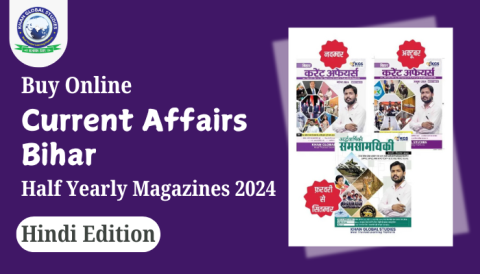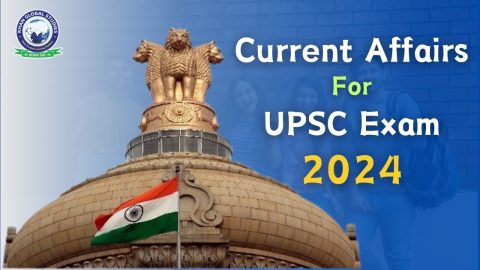Staying ahead in competitive exams like UPSC and State PSC requires more than just textbook knowledge. An in-depth understanding of current affairs is the secret weapon that differentiates successful candidates. In this article, we highlight the multifaceted importance of Current Affairs, guiding you through its relevance, impact and strategies to master this important aspect.
Importance of Current Affairs for UPSC and State PSC Exams
For candidates aiming to crack the prestigious UPSC or State PSC examinations, staying abreast of current affairs is not just an extra task, but it is fundamental to their success. here’s why:
1. Increased Weightage: The UPSC exam pattern emphasizes the importance of current affairs. Questions related directly or indirectly to recent events often appear in the preliminary examination, testing your factual knowledge and understanding. Current affairs become even more important in main examinations. All four General Studies papers often contain questions that require an understanding of recent developments and their interrelationships with various subjects such as politics, economy and international relations.
2. Analytical Ability: UPSC and State PSCs are not just looking for crammers. They look for candidates with strong analytical skills who can connect the dots between current events and their broader implications. By studying current affairs, you develop the ability to critically analyze issues, form informed opinions and present them logically in your written answers and interviews.
3. Dynamic and Contextual Knowledge: The world is constantly evolving, and successful future administrators need to be aware of these changes. By keeping yourself updated with current affairs, you demonstrate your awareness and understanding of the contemporary world. This knowledge proves invaluable at the interview stage, where you may be expected to discuss recent developments and their potential impact on governance.
4. Informed Decision-Making: As future civil servants, you will be entrusted with the responsibility of making important decisions that will impact the lives of countless people. A strong understanding of current affairs equips you with the knowledge and perspective to make informed and well-rounded decisions based on a holistic understanding of the situation.
5. Adaptability and Problem-Solving: The world constantly presents new challenges, and civil servants need to be adaptable and proactive in dealing with them. Studying current affairs exposes you to a wide range of issues, helping you develop problem-solving skills and the ability to think critically in the face of unexpected situations.
6. Gateway to Success: A holistic approach is required to tackle the maze of UPSC and State PSC examinations. Current Affairs serves as a gateway to connect traditional subjects with real-world applications. Integrating them into your preparation enhances your overall understanding and analytical skills.
7. Strategic Reading for Effective Preparation: Strategic reading is the cornerstone of success. Learn the art of extracting relevant information from newspapers, magazines and online sources. Learn to discern the important from the trivial, ensuring that your preparation is focused and effective.
8. Role of Continuity: Continuity is important in the UPSC and State PSC exam journey. Regular updates on current affairs instill discipline and create a habit that ensures that you stay informed during your preparation and no topic remains untouched.
9. Breaking down Complex Topics: Current affairs act as a bridge, breaking down complex topics into manageable components. This simplification aids understanding, ensuring that even the most complex topics become accessible to candidates.
10. Building an all-round personality: UPSC and state PSC exams evaluate more than just academic knowledge. They evaluate your personality, and staying updated with current affairs helps in developing an all-around personality, which is essential for administrative roles.
11. Adapting to changing Patterns: Exam patterns evolve, and staying static can be harmful. Current Affairs offers a dynamic learning curve, which ensures that you can seamlessly adapt to changes and stay abreast of the latest trends in exam formats.
Conclusion
The importance of current affairs in UPSC and State PSC examinations cannot be underestimated. It is the backbone of the entire preparation strategy, providing insights, connections and analytical skills critical to success. Adopt current affairs not just as a study material but as a lifestyle that propels you towards excellence.
FAQ
Question: Can I rely only on textbooks to prepare for the exam?
Answer: Certainly not. While textbooks provide basic knowledge, the inclusion of current events enriches your understanding and application of concepts.
Question: How often should I read newspapers for current affairs?
Answer: Consistency is key. Daily reading ensures that you stay updated, but thorough weekly revision is equally important to maintain focus.
Question: Are online sources reliable for current affairs?
Answer: Yes, you can prepare for UPSC Current Affairs and other competitive exams with Khan Global Studies.
Question: Can I leave Current Affairs for optional subjects?
Answer: No, current affairs should be integrated into all subjects for comprehensive and interrelated preparation.
Question: How can I make current affairs a habit?
Answer: Set aside a specific time to read every day and make it a routine. Habits are formed through sustained efforts.
Question: Is it important to remember all the current affairs?
Answer: Understanding is more important than remembering. Focus on the significance and implications of events.








